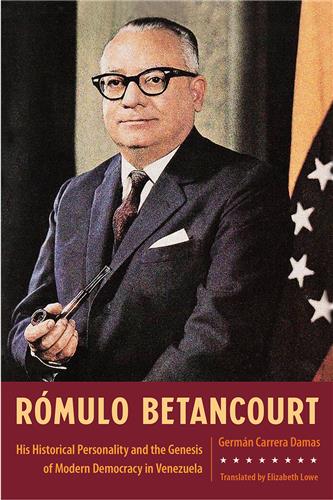Toward a Global History of Latin America’s Revolutionary Left
Edited by Tanya Harmer and Alberto Martín Álvarez
Hardcover: $90.00
Paper: $32.00
Paper: $32.00
Exploring the global connections of Latin America's revolutionary movements in the 1960s and 1970s
“[This] volume’s in-depth analysis of Latin America’s revolutionary left and the broad coverage of the many connections and interrelations between Latin American revolutionaries and their counterparts in other areas of the globe will make it a fundamental point of reference for those studying and teaching not only history but also other social disciplines in the region and the world.”—International Affairs
“The different contributions do an excellent job of getting beyond ideological dogmas to paint a detailed and empirically grounded portrait of the period.”—Bulletin of Latin American Research
“Rich and original contributions . . . offer convincing evidence of the diplomatic strength of Latin America’s revolutionary Left, not only in exile and defeat but also in the throes of revolution and war.”—Latin American Research Review
“The contributors’ use of seldom-tapped archives in Beijing, Moscow, Prague, and various Western European sites sets the volume apart from most studies of the Latin American Left.” —Hispanic American Historical Review
“Succeeds in bringing together voices and narratives previously excluded in the studies of the Latin American Left.” —Hispania
“Essential reading for anyone interested in the impact of transnational solidarity movements on the evolution of thought and organizing within the global Revolutionary Left.”—Jessica Stites Mor, editor of Human Rights and Transnational Solidarity in Cold War Latin America
“An important contribution to reexamining the ways in which we think about the geographies of Latin America’s Revolutionary Left in the global conflict of the Cold War. The volume covers multiple paths and connections that show how each actor was influenced by other regions of the world, but was also influential, creating a better understanding of how each actor was part of the global conflict.”—Aldo Marchesi, author of Latin America’s Radical Left: Rebellion and Cold War in the Global 1960s
This volume showcases new research on the global reach of Latin American revolutionary movements during the height of the Cold War, mapping out the region’s little-known connections with Africa, Asia, and Europe. Toward a Global History of Latin America’s Revolutionary Left offers insights into the effect of international collaboration on the identities, ideologies, strategies, and survival of organizers and groups.
Featuring contributions from historians working in six different countries, this collection includes chapters on Cuba’s hosting of the 1966 Tricontinental Conference that brought revolutionary movements together; Czechoslovakian intelligence’s logistical support for revolutionaries; the Brazilian Left’s search for recognition in Cuba and China; the central role played by European publishing houses in disseminating news from Latin America; Italian support for Brazilian guerrilla insurgents; Spanish ties with Nicaragua’s revolution; and the solidarity of European networks with Guatemala’s Guerrilla Army of the Poor.
Through its expansive geographical perspectives, this volume positions Latin America as a significant force on the international stage of the 1960s and 1970s. It sets a new research agenda that will guide future study on leftist movements, transnational networks, and Cold War history in the region.
Contributors: José Manuel Ágreda Portero | Van Gosse | James G. Hershberg | Gerardo Leibner | Blanca Mar León | Eduardo Rey Tristán | Arturo Taracena Arriola | Michal Zourek
Tanya Harmer, associate professor of international history at the London School of Economics and Political Science, is the author of Beatriz Allende: A Revolutionary Life in Cold War Latin America. Alberto Martín Álvarez, distinguished professor in the Department of Public Law at the Universitat de Girona, Spain, is coeditor of Latin American Guerrilla Movements: Origins, Evolution, Outcomes.
- Sample Chapter(s):
- Table of Contents
- Excerpt
There are currently no reviews available












